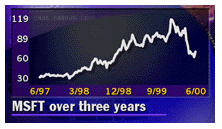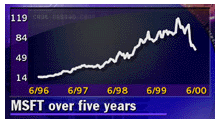|
Is Microsoft stock a buy?
|
 |
June 7, 2000: 5:03 p.m. ET
United it rises, divided it rises not quite as much, according to analysts
By Staff Writer Alex Frew McMillan
|
NEW YORK (CNNfn) - Is a split Microsoft good for investors? No, according to most analysts and antitrust experts.
What should investors do? Sit tight if you hold the stock, stock pickers say. If a split transpires, you could use it to re-jigger your holdings in the part of the company you like best.
|

|
VIDEO
|
|
 CNNfn's Greg Clarkin takes a look at the impact on investors.
CNNfn's Greg Clarkin takes a look at the impact on investors.
|
|
Real
|
28K
|
80K
|
|
Windows Media
|
28K
|
80K
|
|
But if you're not already loaded with MSFT shares, now is likely not the time to rush out and buy them, at least when there are other attractive technology stocks out there, experts say.
Why look for a silver lining in a dark cloud if you can buy blue sky?
Not good for shareholders
If a split does come, it will not be good for holders of Microsoft (MSFT: Research, Estimates), according to Andrew Roskill, senior software analyst with UBS Warburg. "It's a proposal that does not create any kind of shareholder value."
Management would have to pick one successor company to work for and to own stock in. Chairman Bill Gates, CEO Steve Ballmer and co-founder Paul Allen would have to sell lots of stock.
That would inject a selling bias into the market, Roskill said, and depress the stock.
Which company would they stick with, and which would be more valuable? Investors who aren't insiders would get stock in both offshoots. They would be able to keep the Microsoft splinter they prefer and sell the other if they want.
A chance to reshuffle?
Rick Sherlund, the Goldman Sachs analyst, has said the operating-systems business will not attract any top talent.
"No one will go to the operating-systems company," he told The Wall Street Journal. Operating systems is considered the more prosaic business. Aggressive and creative employees would turn to the applications business, analysts say.
 So, presumably, the operating-systems company will be less attractive to other investors, too. Investors who own less than 5 percent of Redmond, Wash.-based Microsoft would own both entities. So, presumably, the operating-systems company will be less attractive to other investors, too. Investors who own less than 5 percent of Redmond, Wash.-based Microsoft would own both entities.
They could sell the operating-systems business and stick to their holdings in the software applications company. But there's an iron fist behind that velvet glove. Plenty of other shareholders would be selling, too. So investors who sell would be selling at depressed prices.
If you hold Microsoft, you have already taken a hefty punch, after enjoying years of knockout returns. Microsoft is already trading around 70, way off its 52-week high of just under 120.
It can't get any worse. Can it?
Contrarians argue Microsoft stock is so depressed, it must be a good buy. Perhaps. But experts admit they don't know what specifics will stem from the case.
 Given that uncertainty, why buy Microsoft when there are other attractive, more-surefire technology investments? That's what Annette Geddes, portfolio manager at M.D. Sass, asks. Given that uncertainty, why buy Microsoft when there are other attractive, more-surefire technology investments? That's what Annette Geddes, portfolio manager at M.D. Sass, asks.
If you are looking at technology, buy a smaller cap company or another area of technology, she told CNNfn's "Talking Stocks." Click here to hear Geddes: 473K AIFF or 473 WAV.
If you have ridden Microsoft down to this point, might as well hold onto it, she said. Otherwise, "there are easier ways to make money in tech," she said.
Remedies will have negative consequences
Even if Microsoft manages to stave off a split, the consequences of whatever remedies the company has to comply with, will hamper its business, analysts say. If there is a split, the offshoots would likewise be hampered.
Melissa Eisenstat, senior software analyst with CIBC World Markets, is one of just two analysts out of 25 with a hold on Microsoft. David Readerman at Thomas Weisel Partners is the other, although his company calls it a "market perform." Most other analysts have higher ratings of the stock.
Eisenstat's hold "is not just within the context of whether they'll break it up or not," she said. In fact, like many analysts, she believes Microsoft will stave off such drastic measures.
Still, what worries her are the other "behavioral remedies" that could affect Microsoft's profitability. They include pricing restrictions on what Microsoft can charge for software. "That could change the earnings model. That's the risk at this time," she said.
Monopolies are winners for shareholders
Microsoft is a monopoly because it has been so successful. The Department of Justice is trying to change that situation.
Analysts say technology moves toward dominant companies, like Cisco Systems (CSCO: Research, Estimates) in networks, Oracle (ORCL: Research, Estimates) in databases and Sun Microsystems (SUNW: Research, Estimates) in servers.
That's because companies enjoy having standards to gravitate toward. Conspiracy theorists aside, analysts say consumers benefited from Microsoft, too.
"Can you honestly say, with any degree of confidence, 'Thank God the Justice Department is saving consumers from Microsoft?" Roskill asked.
The Justice Department has said it is not out to get Microsoft. But whatever effects it produces penalize Microsoft's business, analysts say. And that is bad for stockholders.
"A monopoly is good for shareholders," said Martin Reynolds, Dataquest software analyst. "You get a higher return on your investment than you should have."
Past not a lot of prologue
Many observers point to encouraging past divestitures of monopolies, particularly Standard Oil in 1911 and AT&T in 1984. But investors are warned past performance is no guarantee of future results, and for good reason.
 For Microsoft, "I don't think it's terribly interesting to look at past divestitures," said William Kovacic, George Washington University Law School professor, who studies past divestitures. For Microsoft, "I don't think it's terribly interesting to look at past divestitures," said William Kovacic, George Washington University Law School professor, who studies past divestitures.
Past monopoly breakups involved distinct subsidiaries. Division leaders of the Baby Bells, for instance, could step in relatively easily as CEOs of new entities.
In fact, Kovacic has even suggested Standard Oil executives welcomed the chance to shake free of New York and become more entrepreneurial.
But AT&T worked out well, didn't it?
There are other reasons not to look at the precedents. They all had tangible assets. Where Standard Oil had refineries, AT&T had telephone lines. Microsoft involves splitting teams that, effectively, make ideas.
"This is the first time going back to 1890 in which the key assets of the company to be broken up consist of human beings and ideas," Kovacic said. "Who can predict what these people will do, and how effective the entities will be?"
The point is often made that AT&T shareholders did well after the breakup. But the sum of parts was not in fact greater than the whole, two University of Louisville professors say.
Jay Brandi and S. Srinivasan looked at AT&T's performance 10 years before and after the breakup. In almost every measure, performance was slightly worse post-split.
Sure, the Baby Bells generated good returns. But telecommunications has been a growth industry. AT&T investors would have done better with one entity, they concluded.
But no one knows for sure. Only one outcome is possible. AT&T was divided. Analysts expect Microsoft to remain whole.
Furious debate consumes the case, and every point is contested -- even whether Microsoft is a monopoly, which Jackson has found is fact.
Breaking up is rough justice
What to do in case of a split may be a moot point. Analysts agree with Microsoft's Ballmer that a split is unlikely, even though Judge Thomas Penfield Jackson ruled today that the monopoly should be cleaved in two.
 Now Microsoft is expected to appeal. Its chances of avoiding a split, with one unit selling operating systems like Microsoft Windows and the other selling applications like Microsoft Office, are good, analysts say. Now Microsoft is expected to appeal. Its chances of avoiding a split, with one unit selling operating systems like Microsoft Windows and the other selling applications like Microsoft Office, are good, analysts say.
"The bottom line is, the way things are laid out on the table right now, they just aren't going to work," said Roskill at UBS Warburg said. "The government doesn't really understand how technology works."
Debate on all fronts
Naturally, in such a contentious case, some contrarian analysts believe splitting Microsoft would be positive. Dataquest's Reynolds, for instance, believes it would encourage competition.
That would help other companies most, of course. But it could benefit Microsoft, Reynolds said, which he thinks isn't as competitive as it could be.
"Look how long it took Windows 2000 to come out," he said. "Separating the companies won't hurt, and it potentially could help."
There is an equation. The benefit to society and technology of busting a monopoly will be a cost to Microsoft shareholders, Reynolds said.
Long term, analysts expect Microsoft to perform well. But splitting it will not help investors, they say.
It may not come to that. "I look at the breakup analysis as more of an interesting intellectual exercise," Eisenstat said. 
|
|
|
|
|
 |

|

